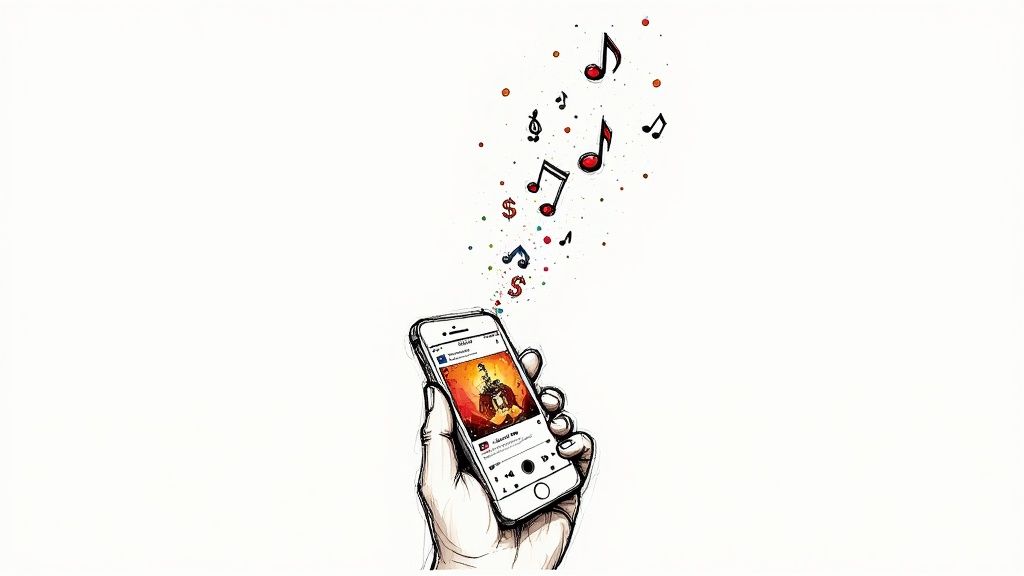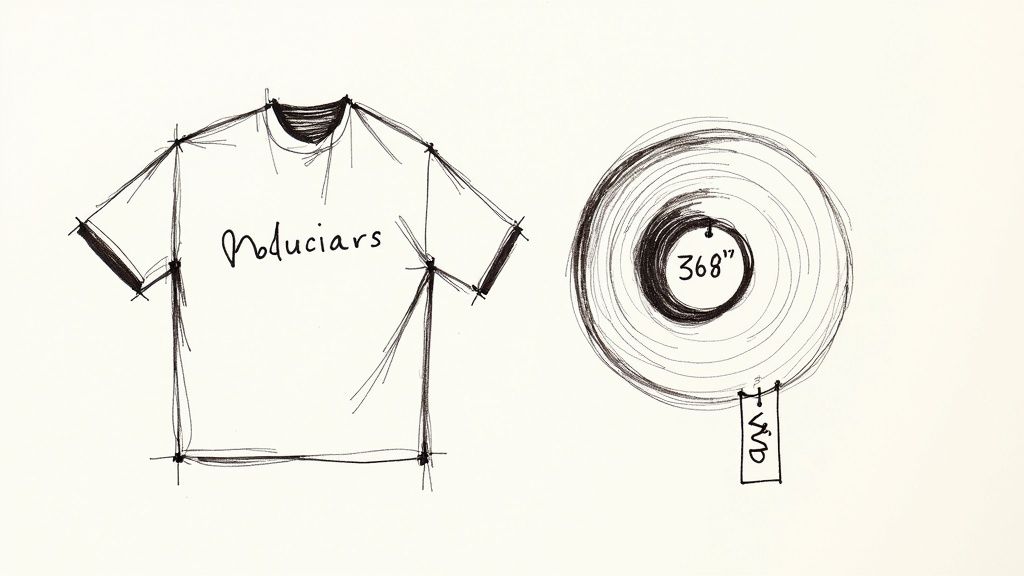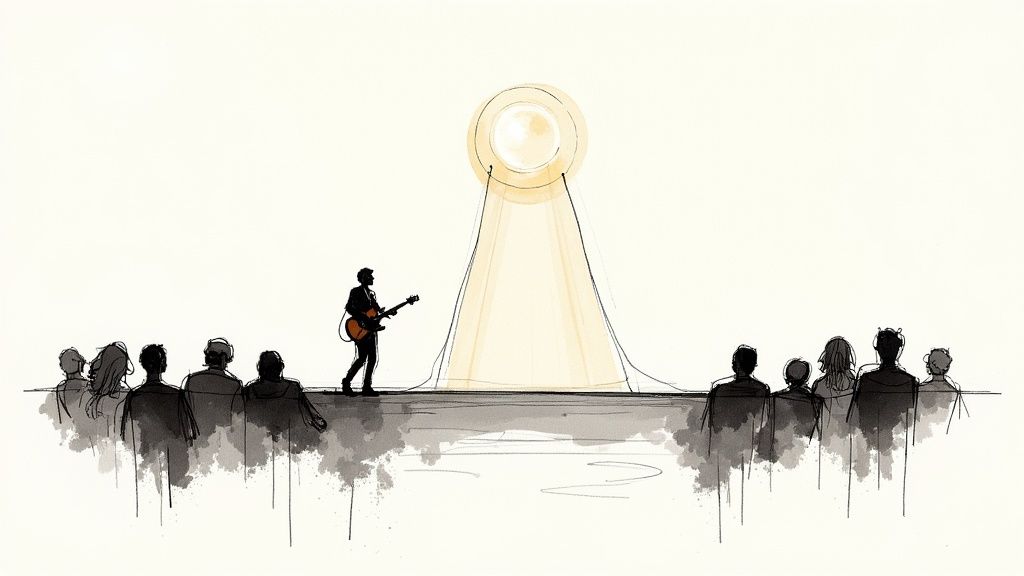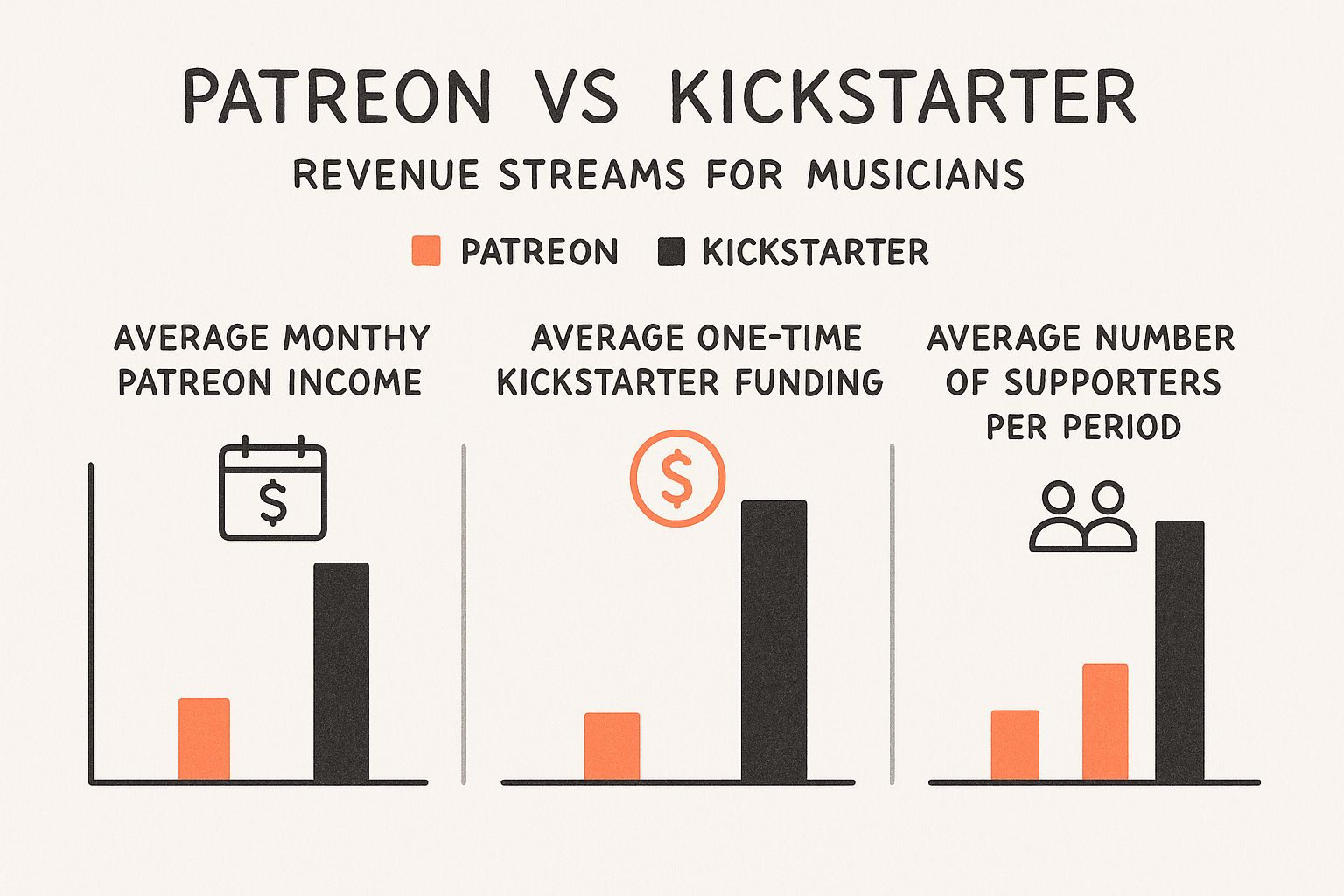How to Make Money as a Musician: Proven Strategies to Succeed
- mattspencer1138
- Jul 4
- 15 min read
If you're serious about turning your music into a career, you need to think beyond just creating the art. The real game starts when you build a few different ways to get paid for it. This means combining the slow-burn income from your actual music with more direct cash from things like merchandise and live shows. Getting this mix right creates a much more stable financial picture for you as an artist.
Build Your Foundation by Monetizing Your Music

First things first: you need to get paid for your art. This all starts with getting your songs onto the platforms where people actually listen, like Spotify and Apple Music. But it’s not just about uploading—it's about understanding how the money flows from a listener's ears back into your pocket.
Let's break down the primary ways your actual recordings and compositions can generate income. These are the foundational streams you need to have in place before you even think about T-shirts or tickets.
Your Direct Music Income Sources
Income Stream | How It Works | Real Earning Potential |
|---|---|---|
Streaming Royalties | You earn a fraction of a cent every time someone streams your song on platforms like Spotify or Apple Music. | High volume is key. It's a numbers game, but it can become a steady, passive income source over time. |
Mechanical Royalties | Earned from the reproduction of your song, either through physical sales (CDs, vinyl) or digital downloads and streams. | Your distributor typically collects these. Can be significant if a track gets popular or is covered by another artist. |
Performance Royalties | Generated when your song is played in public—on the radio, in a coffee shop, on TV, or live at a venue. | Collected by your PRO (ASCAP, BMI). This is "mailbox money" you'll miss out on entirely if you're not registered. |
These streams are the bedrock of your music business. While a single stream might only be worth a fraction of a penny, they add up over thousands—or millions—of plays. Now, let's get into the specifics of how to set this up.
Getting Your Music on Streaming Platforms
Before you can earn a dime from streaming, you need a way to get your music on the streaming services. That’s where a digital distributor comes in.
Think of services like DistroKid, TuneCore, or CD Baby as the middlemen who connect your finished tracks to global platforms. They take care of the heavy lifting—uploading your music, collecting the royalties you're owed, and sending you the money. In return, they usually take a small annual fee or a cut of your earnings. It’s a necessary step.
Having the skills for how to produce music at home is a massive advantage here. It gives you total creative freedom and slashes your expenses. No more booking pricey studio time. You can create and release music faster and keep more of the profits.
The money in streaming is real, and it’s growing. Spotify recently paid out a staggering $10 billion to the music industry in a single year. That money doesn't just go to the A-listers; it trickles down to indie artists, too. This growth is powered by over 500 million paying subscribers worldwide, which proves there's a huge audience out there willing to listen.
Collecting All Your Royalties
Just putting your music on Spotify isn't enough. That only covers one type of royalty. To make sure you're capturing all the money you're owed, you absolutely must register your songs with a Performance Rights Organization (PRO), like ASCAP, BMI, or SESAC in the US.
A PRO's job is to track down and collect performance royalties for you. This is money generated anytime your music is played in a public setting—think radio, TV shows, commercials, or even background music in a restaurant or gym. If you aren't signed up with a PRO, you're literally just leaving that money on the table.
Here's a simple way to think about the two main royalty types:
Mechanical Royalties: These are for the sale or stream of your song. Your digital distributor (like DistroKid) is responsible for collecting this for you.
Performance Royalties: These are for the public performance or broadcast of your song. Your PRO (like BMI or ASCAP) collects this for you.
Essentially, your distributor gets you paid for the recording, and your PRO gets you paid for the composition (the lyrics and melody). You need both systems working for you to truly maximize your music income.
Transform Your Artistry Into a Profitable Brand

Let's be real: your music is the core of what you do, but your brand is what ties everything together. In today's industry, the most successful artists aren't just musicians; they're entrepreneurs. They understand that their story, visuals, and values are just as critical as their sound.
This brand is the bedrock for building new income streams, and one of the most powerful is merchandise.
Forget the generic black t-shirt with your logo slapped on it. Your merch needs to feel like a tangible piece of your world. Is your music dark and atmospheric? Think about custom-designed candles or unique art prints. Got a vibrant, retro sound? Limited-edition cassette tapes or embroidered patches will connect with your audience on a much deeper level.
The idea is to create items that fans actually want to own. When they buy something, it's not just a transaction; it's an act of supporting the art and the artist they love. That’s how you start building a real, sustainable business around your music.
Building Your Online Storefront
Getting a shop up and running is easier than you might think. Platforms like Shopify give you all the tools to build a powerful, custom online store. Even better, services like Bandcamp have fantastic merchandise tools built right in, living alongside your music. This is a game-changer because a fan can go from discovering a new track to buying a hoodie in a single visit.
But don't just launch your store and hope for the best. The real magic happens when you connect with the communities you've already built. Announce new merch drops exclusively to your email list first to make them feel like insiders. Use your social media to tell the story behind a new design—show your creative process, the initial sketches, anything that brings them into your world.
Your brand isn’t just a logo; it’s the entire experience you offer your fans. From the sound of your music to the quality of your merch, every detail works together to build loyalty and create a sustainable career.
This direct-to-fan model is a crucial part of making money as a musician today. It puts you in control of your products, pricing, and profits, letting you sidestep the traditional industry gatekeepers.
Creating a Sustainable Fan Community
If you're looking for a more consistent, reliable income stream, you need to look at building a subscription-based community. A platform like Patreon is perfect for this. It helps you turn your casual listeners into active, paying supporters who chip in a set amount each month.
In return? They get exclusive access to you and your work.

Patreon allows you to set up different reward tiers, which effectively turns your creative process itself into a product for your biggest fans.
Here are a few ideas for what you can offer your patrons:
Early Access: Let them hear new songs or see music videos before anyone else.
Behind-the-Scenes Content: Share raw demo recordings, scribbled lyric notes, or vlogs from the studio.
Exclusive Merch: Create cool items that are only available to your paying members.
Direct Interaction: Host monthly Q&A sessions or even offer personalized video messages.
This strategy creates a steady monthly income that helps balance out more unpredictable revenue from things like ticket sales or streaming royalties. As the global music industry grows toward an estimated $65.45 billion, diversifying your income through smart branding and community-building is how you'll claim your piece of the pie. You can dig into more of the numbers with these in-depth music industry statistics.
How to Get Paid for Your Live Performances

Live shows are the absolute lifeblood of any musician's career. It’s not just about building a loyal fanbase; it's a critical source of income. But knowing how to actually make money from performing means you have to move past the "I'll play any gig I can get" mindset. It's about being strategic and booking shows that truly pay well and push your career forward.
While streaming royalties build that slow, steady, long-term income, live gigs put cash in your pocket tonight. That immediate cash flow is what you need to reinvest in your music—whether that's paying for studio time, grabbing new gear, or funding a real marketing push.
Your streaming data can even become your secret weapon for tour planning. You can use a Spotify artist earnings calculator to see exactly where your listeners are clustered, then go book shows in those cities. Smart, right?
Create an Unforgettable Electronic Press Kit
First things first: you can't book a decent show without a professional Electronic Press Kit (EPK). This is your digital resume. It's the very first impression you'll make on venue bookers, talent buyers, and festival organizers. A sloppy or unprofessional EPK is a one-way ticket to getting your email deleted on sight.
Think of your EPK as a clean, easy-to-scan one-sheet or mini-website that gives them everything they need, instantly.
It absolutely must include:
High-Quality Photos: You need both killer live shots and professional press photos. No exceptions.
A Compelling Bio: A short, punchy summary of who you are and what your music sounds like. Make it interesting.
Your Best Music: Embed links to your top 2-3 tracks on Spotify or SoundCloud. Don't overwhelm them.
Live Performance Videos: A short, well-shot video is non-negotiable. It proves you can actually command a stage.
Press and Testimonials: Got a good review or a shout-out from another venue? Put it in there.
Your EPK's main job is to make the booker's life easier. They should be able to grasp your sound, see your professional image, and hear your best tracks in under 60 seconds. If they have to hunt for anything, you've probably already lost the gig.
Pursue High-Value Gigs
Let's be real: not all gigs are created equal. Sure, playing for "exposure" in the corner of a noisy bar has its place when you're starting out. But to make a real living, you have to start focusing on high-value opportunities. The financial difference between different types of gigs can be absolutely massive.
Performance Options to Consider
Gig Type | Payment Potential | Audience Engagement |
|---|---|---|
Local Bar/Club | Low to moderate pay (or a door split). | Can be great if it's your crowd, but often noisy and distracted. |
Opening for a National Act | Usually a flat fee. The real value is exposure. | A golden opportunity to win over a new, attentive audience. |
Private/Corporate Events | High pay. Often your most lucrative gigs. | Professional setting, but the audience isn't always there for you. |
Weddings | Very high pay. Can be a stable income source. | The crowd is there to party and loves good music. |
The most overlooked but often most profitable path? The world of private events. Weddings, corporate parties, and private functions pay significantly more than your typical club show. You might even consider building a separate brand or setlist just for these events. It can provide the financial stability you need to pour back into your original music.
Don't underestimate the power of a well-paying Saturday night wedding gig to fund your passion projects.
Unlock Your Alternative Income Streams
Let's be real: financial stability as a musician almost never comes from just one place. If you want to build a sustainable career, you have to think beyond just streaming royalties and ticket sales. The good news is, there are plenty of powerful, often overlooked, ways to make money from your music.
We're going to break down some of these alternative paths that can turn your passion into a more reliable paycheck.
Breaking Into Sync Licensing
One of the most exciting—and potentially lucrative—avenues is sync licensing. This is the art of getting your music placed in films, TV shows, commercials, or video games. A single great placement doesn't just come with a nice paycheck; it can expose your music to a massive, entirely new audience overnight.
But how do you even get your foot in the door?
The world of sync can feel like a closed-off club, but there are definite ways in. The gatekeepers are music supervisors—the pros hired by production companies to find that perfect track for a scene. Your goal is to make their job as easy as possible.
It all starts with your tracks. You need high-quality, fully mixed and mastered instrumental versions of your songs. So often, a director wants the mood and energy of your song but can't have vocals interfering with dialogue. Having those instrumentals ready to go instantly makes your catalog more valuable.
Next, you have to get your music in front of the right people. This is where you can use services that bridge the gap between indie artists and licensing opportunities.

Monetizing Your Musical Skills
Another fantastic—and often more immediate—income stream is teaching. Think about it: all those years you've spent practicing have given you a skill that people will gladly pay to learn. And it doesn't have to mean scheduling a rigid week of in-person lessons.
The modern way of teaching is far more flexible. Consider these models:
Private Online Lessons: Jump on a Zoom call and teach students anywhere in the world. This gives you incredible flexibility and a global pool of potential clients.
Scalable Online Courses: This is a game-changer. Record a comprehensive course on a platform like Teachable or Skillshare. It's a "create once, sell forever" model that can generate passive income for years.
Niche Workshops: Go deep on a specific topic. Host a one-off workshop on something like "Songwriting for Beginners" or "Home Studio Recording on a Budget."
Your expertise is a product. Whether you're teaching guitar licks, sharing production tricks, or offering vocal coaching, you're turning your knowledge into revenue that can directly fund your next creative project.
Exploring Other Creative Avenues
Beyond sync and teaching, there are other hidden gems that can bring in serious cash. These usually involve taking a skill you already have and applying it in a new way. It's not just about selling albums anymore; there are countless eight effective strategies to monetize digital content that can open up new doors.
For instance, if you're a beast at sound design, you can create and sell sample packs to other producers on platforms like Splice. Those unique drum sounds, synth loops, or vocal chops you create could become a fantastic source of passive income.
Don't forget about session work. Getting hired to play guitar or sing on another artist's track is a classic way to earn money while keeping your skills sharp and making new connections.
Alternative Income Stream Potential
To give you a clearer picture, let's compare some of these options. Not every income stream is created equal—some require more upfront work, while others offer better long-term potential.
Income Stream | Effort to Start | Realistic Income Potential | Scalability |
|---|---|---|---|
Sync Licensing | High | Low to Very High | Medium |
Teaching (Private) | Low | Medium | Low |
Teaching (Courses) | Medium | Medium to High | High |
Sample Packs | Medium | Low to High | High |
Session Work | Low | Low to Medium | Low |
Crowdfunding | High | Varies Greatly | Low |
As you can see, something like private teaching is easy to start but hard to scale, whereas an online course takes more initial effort but can grow into a major passive income source. Finding the right mix for your skills and goals is the key to building a truly diversified and resilient music career.
Manage Your Career Like a Music Business
To make the jump from a passionate hobbyist to a pro, you have to start thinking like an entrepreneur. It's a tough pill to swallow for some creatives, but earning real money as a musician takes more than just talent—it demands a business-first mindset. This means treating every dollar earned and spent with intention. You're building a financial foundation that lets your creativity run wild, free from the constant stress of wondering how you'll pay the bills.
The very first, non-negotiable step? Get organized. Seriously. Fire up a simple spreadsheet and start tracking every penny of income and every single expense. This isn't just about making tax time less of a nightmare; it's about gaining clarity. Knowing exactly where your money is coming from and where it's going is the only way you can start making smart decisions for your career.
Separate Your Financial Worlds
One of the most powerful habits you can build right now is to completely separate your music finances from your personal life. Go to the bank and open a dedicated business account. Get a separate debit or credit card that you only use for music-related transactions.
This one simple move pays off big time:
A Clear Financial Picture: You'll instantly see whether your music is actually profitable or not.
Simplified Tax Prep: No more agonizing for hours, trying to sort your studio snacks from your string purchases.
Professionalism: It sends a powerful signal—to yourself and others—that you are dead serious about your career.
Mixing your funds is a surefire recipe for confusion and missed opportunities. When the money from a gig lands in the same account you use for groceries, it's impossible to tell if you're building a sustainable business or just bankrolling an expensive hobby.
Treating your music like a business isn't about selling out; it's about buying in. You're investing in your own future, creating the stability needed to pursue your art on your own terms for the long haul.
As your income starts to pick up, you'll need to think about financial planning. A huge piece of that puzzle is setting money aside for taxes. As an independent artist, you're your own employer, which means nobody is withholding taxes for you. A solid rule of thumb is to stash away 25-30% of every single payment you receive. Put it into a separate savings account just for your future tax bill. Don't touch it.
Understand Your Contracts and Legal Structure
Sooner or later, you're going to be faced with a contract. It could be for a distribution deal, a sync license, or a work-for-hire gig. You absolutely must understand what you're signing. Hone in on the clauses about royalty splits, who owns the master recordings, and how long the contract lasts. Never, ever be afraid to ask questions or get a lawyer to look over any major deals.
Once your income becomes more consistent, you might want to formalize your business by forming a Limited Liability Company (LLC). An LLC creates a legal wall between your personal assets and your business debts, giving you a crucial layer of protection. This is usually a smart move once you're reliably generating a few thousand dollars a year from your music.
The global music market is bigger than ever, which means more opportunities for artists like you. Recent IFPI reports show recorded music revenues have climbed for a decade straight, hitting $29.6 billion thanks in large part to a 9.5% jump in subscription streaming revenue. This trend proves that a scalable income is entirely possible.
By managing your finances, understanding your legal footing, and planning for the long term, you're building a resilient career. Think of these business fundamentals as the engine that powers your art. If you're ready to go deeper, check out our guide on music business marketing tips and proven strategies.
Common Questions About Making Money With Music
Diving into the financial side of a music career always stirs up a ton of questions. Let's tackle some of the most common ones we hear from artists who are trying to figure out how to turn their passion into something that actually pays the bills.
How Much Can a Beginner Musician Realistically Make?
When you're just starting out, your income is almost guaranteed to be unpredictable. It’s crucial to set realistic expectations. Early on, you might be looking at a few hundred dollars a month, patched together from a bunch of different places.
That could be cash from a few local gigs, selling a handful of t-shirts at your shows, and maybe a slow trickle from streaming. The real key here isn't to hit a home run with one income stream, but to build several small ones at the same time.
A solid goal for your first year is just to cover your music-related costs—think gear, distribution fees, or a small marketing budget. Success at this stage isn’t about quitting your day job. It’s about seeing slow, steady growth across everything you’re doing.
Do I Need a Manager to Start Making Money?
The short answer? Absolutely not. In fact, in the early days of your career, it’s way more valuable to learn the business yourself.
Getting your hands dirty teaches you things you can't learn any other way. You'll figure out how to book a gig, how to run a social media account that people actually care about, and how to register a song with a PRO. That foundational knowledge is priceless.
Managers usually take a commission of 15-20% of your gross income. It only really makes sense to bring one on board once your career is generating enough money—and enough admin work—to make that cost worth it. Build the business first, then hire help.
What Is the Most Overlooked Income Stream?
For most independent artists I talk to, it’s a tie between teaching music and playing hyper-local gigs. Neither one is particularly glamorous, but they are incredibly reliable ways to fund your bigger, more creative projects.
Offering lessons, whether online or in person, creates a steady income that doesn’t rely on your next big release. You can teach guitar, production, or songwriting and build a consistent cash flow that keeps the lights on.
Similarly, playing at local farmers markets, private parties, or corporate events often pays way better—and more reliably—than a Tuesday night slot at a dive bar. For a deeper look at all the possibilities, you can explore the nine ways musicians make money in 2025 to see the full spectrum of opportunities.
Is It Better to Focus on Streaming or Live Shows?
Honestly, you need to do both. But where you put your focus will shift depending on where you are in your career. It's not an "either/or" question; it's a "both/and" strategy.
Early on, live shows are your lifeblood. They're the best tool you have for building a real, local fanbase and making immediate cash from tickets and merch. This is your active income and your community-building engine.
As your audience grows, streaming morphs into a much more significant, scalable source of passive income. It's your long-term, global-reach engine. Think of it as an evolution: use live shows to build momentum, then use that momentum to drive more streams.
Ready to take control of your Spotify presence and turn listeners into revenue? artist.tools provides the data and insights you need to grow your audience, find the right playlists, and protect your music from fake streams. Stop guessing and start making data-driven decisions for your music career. Explore the platform at artist.tools and see how we can help you succeed.
Comments